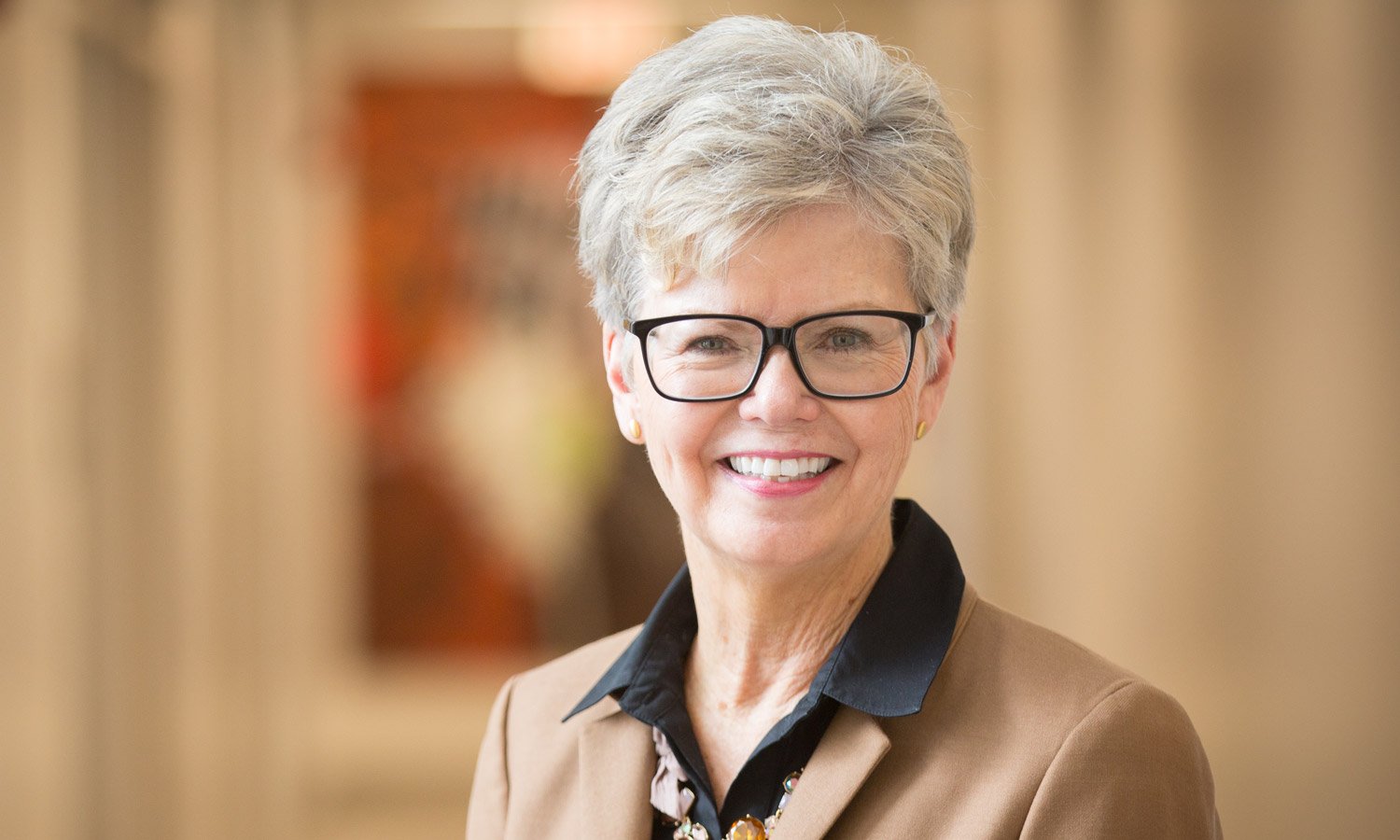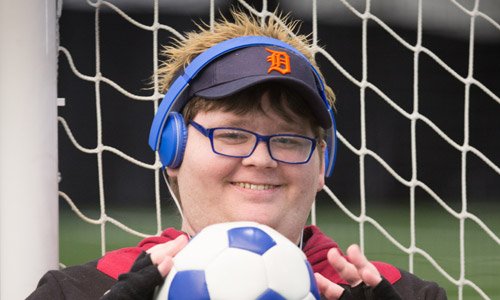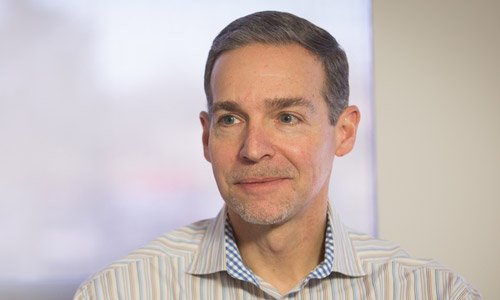Features

Janet E. Graetz, Ph.D., oversees the University’s far-reaching efforts to improve the quality of life for those with Autism Spectrum Disorder in southeast Michigan.
Features
Winter 2016
| by Sandra Beckwith
CENTER FOR AUTISM
Overarching group serves students, community, state
While Janet Graetz, Ph.D., leads expanding efforts to research and serve those on the autism spectrum, she is happiest working with the adolescents and young adults with autism.
“I love teaching, but my heart is with working with this specific population,” said the associate professor of Special Education and coordinator of Academics within Oakland University’s groundbreaking Center for Autism.
Dr. Graetz knows that to effectively serve those with Autism Spectrum Disorder (ASD) in southeast Michigan, she needs to spend time overseeing the University’s far-reaching efforts to improve their quality of life.
Under the Center for Autism umbrella, OU faculty, staff and students integrate academic coursework in special education, empirical research and hands-on work in the community to prepare professionals to be leaders in the autism community. Collectively, these programs also support individuals and their families.
Dr. Graetz serves as a facilitator for the OU Autism Council, which includes faculty and staff from across the University who collaborate to further the autism research agenda at OU. She also facilitates the Asperger’s Panel, which consists of faculty and staff who meet to discuss how best to support students at OU who have self-disclosed as having an Autism Spectrum Disorder.
Dr. Graetz also has been speaking to faculty at several community colleges to further the awareness of college students with autism. In 2013, she presented on “Adult Issues and ASD” at the Council for Exceptional Children National conference in Texas. Dr. Graetz and colleague Chaturi Edrisinha, Ph.D., BCBA-D, director of research for the Center for Autism, also speak to groups about sexuality and autism. Dr. Graetz is coordinating a conference on “Autism and Sexuality: Challenges and Hidden Dangers,” set for March 31 at Oakland University.
The timing for this collaborative effort among various schools within OU, the community at large and the state of Michigan could not be better.
According to the Centers for Disease Control and Prevention, the number of children in the U.S. diagnosed with an ASD has grown 120 percent in the past 15 years ― from one in 150 to one in 68 children.
Center for Autism programs encompass three areas:
- Academics for students studying special education
- Community outreach
- Research
Long-standing academic programs
Academics represent the University’s most long-standing work with autism ― the school has offered an academic program for special education teachers for more than 25 years.
The autism-related program is multi-faceted, providing classroom instruction and opportunity for students to work hands-on with those on the spectrum. That includes helping a small group of children ages 3 to 6 who attend the school’s Applied Behavioral Analysis (ABA) Autism Clinic in Pawley Hall to develop better social skills before they become school-age.
Special education academic coursework related to autism is concentrated in two areas ― ABA and Autism Spectrum Disorders. The University is also developing a Ph.D. program in autism as well as a program designed to train board-certified assistant behavioral analysts and registered behavior technicians.
Working with the Michigan Department of Health and Human Services, OU’s goal is to increase the number of people in the state who can provide services to the autism community which, in turn, should not only improve the quality of life for those with autism, but also reduce the incidence of other social problems related to the disability, including crime.
State renews $380,000 autism grant
Expanded research
Data from autism research from new and ongoing activities will be captured so that OU can identify the impact specific programs have on individuals with autism. This data will help the school identify, publish and teach best practices. Various elements will be used to educate parents.
Researchers will study Extraordinary Ventures Michigan, a School of Business Administration collaboration; the Judson Center; and the school’s soccer, swimming and basketball programs for children with ASD.
Autism research moves to the forefront
OU in the community
The OUCARES initiative focuses on improving quality of life for individuals with ASD and their families. Several programs target social and life skills and train for employment. Recreational sports develop motor skills and coordination and help participants improve socialization, gain independence and build confidence.
Leading the way to understanding, greater quality of life
“The increase in the size of the population diagnosed with ASD is a huge concern to the state of Michigan right now,” Dr. Graetz said. “It is important for us to develop the educators, technicians, best practices and opportunities that will help these individuals live with greater confidence and more independence as adults.”
Sandra Beckwith is a freelance writer from Fairport, New York.
Janet E. Graetz, Ph.D.
Associate Professor, Department of Human Development and Child Studies
Special Education Coordinator
Center for Autism
Dr. Graetz joined Oakland University in 2003. She teaches courses on communication and language, and behavior and social issues as they relate to students with Autism Spectrum Disorder (ASD); collaboration and consultation for special education teachers; and educational procedures.
Dr. Graetz’ research interests include adolescent and adult issues relative to ASD, technology and its impact and use with disabled children and youth, and the impact of autism on mothers and families in India.
Dr. Graetz has taught children with ASD and severe cognitive impairment, coordinated curriculum, and administered programs for the Wayne County Intermediate School District. She has also worked in a state institution for severely disabled children.
Dr. Graetz earned a Ph.D. in Special Education/Instructional Technology from George Mason University, an Ed.S. in Special Education Administration and an M.Ed. from Wayne State University, and a B.S.in Education (Speech and English) from Bowling Green State University. She holds certification in Interdisciplinary Specialization in Culture and Disabilities from the University of Hawaii at Manoa.
RESEARCH
Graetz, J.E. (May 2010). The Value of Micro-enterprise: Less “Me,” More “We.” Organization for Autism Research Monthly Newsletter. Retrieved from http://www.researchautism.org/resources/newsletters/2010/May_2010.asp
Graetz, J.E. (2010). Autism Grows Up; Opportunities for Adults with Autism. Disability & Society, 25(1), 33-47.
Graetz, J. E. (2009). Effective Academic Instruction for Students With High-Functioning Autism or Asperger’s Syndrome. Characteristics and Classroom Implications. In Simpson, C. & Spencer, V. Teaching Children with Autism in the General Classroom. 350 pp. Prufrock Press. ISBN-10: 1593633645. ISBN-13: 978-1593633646
Graetz, J.E., & Spampinato, K. (2008). Asperger’s Syndrome and the Voyage through High School: Not the Final Frontier. Journal of College Admission, (Winter), 19-24. www.NACANET.org
Mastropieri, M.A., Scruggs, T.E., Graetz, J.E., Norland, J., Gardizi, W., & McDuffie, K. (2005).Case Studies in Co-Teaching in the Content Areas. Successes, Failures, and Challenges. Intervention in School and Clinic,40(5), 260-270.
Agosta, E.; Graetz, J.E., Mastropieri, M.A., & Scruggs, T.E. (2004).Teacher-Researcher Partnerships to Improve Social Behavior through Social Stories. Intervention in School and Clinic, 5(39), 276-287.
RESOURCES
https://autismallianceofmichigan.org/


